A few days ago, a user posted in the Overwatch Beta feedback section of the Blizzard forums that they were uncertain about one of Tracer’s victory poses in the game, a version of the infamous butt pose. User Fipps didn’t seem to have an issue with other characters who posed in similar ways, and in fact praised the range of personalities found in the female characters in the game, but said that the pose just didn’t quite fit with presentations of Tracer.
Fipps referenced character art for Tracer, and the development of the character through Blizzard’s media blitz and the beta, laying out the following arguments:
…With that being said, lets talk about Tracer. From a marketing standpoint, she’s the star of the show. She’s a great hero. When we look at the way she’s portrayed in promotional media, lore, and art in game we know a few things about her..
She’s Fast.
She’s Silly.
She’s Kind.
She’s a good Friend.
Her body seems to be comprised of about 95% spunk.Almost all of her art reflects this. [Note: Fipps posted links to video and images of Tracer.]
Then out of seemingly no where we have this pose:WHAT? What about this pose has anything to do with the character you’re building in tracer? It’s not fun, its not silly, it has nothing to do with being a fast elite killer. It just reduces tracer to another bland female sex symbol.
We aren’t looking at a widowmaker pose here, this isn’t a character who is in part defined by flaunting her sexuality. This pose says to the player base, oh we’ve got all these cool diverse characters, but at any moment we are willing to reduce them to sex symbols to help boost our investment game.
Blizzard’s Jeff Kaplan, game director for Overwatch, responded on the forums and said the pose would be removed. “We’ll replace the pose. We want *everyone* to feel strong and heroic in our community. The last thing we want to do is make someone feel uncomfortable, under-appreciated or misrepresented. Apologies and we’ll continue to try to do better.” Outcry followed; Kaplan posted again, clarifying that they weren’t just removing the post because someone complained (or to placate those pesky social justice warriors), but because they agreed that it didn’t fit the character. There’s no sign that they’re removing similar poses from characters like Widowmaker, referenced above by Fipps, where it’s more fitting. Just from Tracer. The debate, however, has continued to rage. Was it sexist design? Was the pose a big deal? Are we all too sensitive? Is this censorship, or is it artistic integrity? Is Blizzard just caving? Is the apocalypse upon us? Is this the removal of all butts for all time?
Sorry. I can’t help but feel a little, well, cheeky, over it all. Kaplan made a decision, which seems sensible enough and grounded in good reasoning, though maybe the situation could have been handled better. By now I think I’ve made my stance on this particular pose pretty clear and I think careful consideration of how and when characters in a game present themselves is a very good idea. Being true to individual characters, and treating them like more than cardboard constructions or tropes is how we get better characters, period. But in the end, this is just another discussion around a game, particularly an unfinished game, over what is and isn’t sensible or acceptable, and to whom, and while that’s certainly important (I mean, we have a whole site dedicated to those discussions, after all; welcome and enjoy your stay), in this particular case, it’s the framing of the arguments that I find fascinating. Here are some (paraphrased) comments I’ve seen repeatedly around the issue (including in response to Fipps’ original post):
- It’s a beta; the devs listened to feedback and they agreed that the pose didn’t fit Tracer, so they took it out.
- Real women pose like that in suggestive ways so why not Tracer?
- Blizzard wasn’t intentionally sexualizing Tracer; you’re the one who sees it that way.
- Just add some men posing like that and then everything is equal.
- But other characters pose like that so why is it bad for Tracer?
- It’s just a butt, so what’s the big deal?
- It’s not sexualized, just bad anatomy/art.
And, my favorite: It’s Blizzard’s game so they can do whatever they want (until, of course, they remove the pose, and then it’s no longer about artistic freedom, which I guess only goes one way, since the artistic integrity arguments fade once they “cave”).
Every one of these arguments could be put through some kind of logical test… if we grant that the way the individual speakers are defining words and worlds is true (for them). “Humans have butts, and that’s fine, so what’s so bad about Tracer’s butt?” On paper, you could work that out, if you stripped away context, character, and experience. The same is true of all the above arguments, and others made around the Tracer situation, like so, with a couple of reasoning exercises:
- Unnecessary sexualization is bad.
- Tracer’s pose was unnecessarily sexualized.
- Therefore, Tracer’s pose was bad.
Or perhaps:
- 95% of the players on Blizzard’s forums* did not see Tracer’s pose as sexualized.
- Therefore, 95% of Overwatch’s total potential audience would have not seen the pose as sexualized.
*I unabashedly made up that statistic.
Logic, worked out on paper (with the problems of inductive reasoning on full display), but predicated here on highly nuanced (and personal) definitions. This isn’t as simple as the mortal/man syllogism because this discussion isn’t based on facts, but ideas. The facts are: one person posted to the forums, others responded, Kaplan responded, action was taken, the discussion continued. But what matters are questions about the facts, and about the people involved, such as: What’s sexualized? Who decides? Where are the lines drawn? How might they differ from person to person? What’s a big deal and what isn’t? We can focus on the process of reasoning with every argument made, and indeed, I’m sure all the arguers are convinced of their own rationality when speaking out on the issue at hand. But there are as many definitions and benchmarks for sexist and sexualized representations as there are discussions around the issue. “It’s just a butt, so what’s the big deal?” is the kind of argument that is often defended as logical (people have butts, they actually exist in life, so get over it); so too with the people who argue that if Blizzard just creates similar poses for the men, the problem disappears. This is seen as rational. Balanced. But it’s predicated on someone considering their worldview — hinging here on whether or not a butt-centric pose is a “big deal” — their truth. And at the root, it is the same kind of base argument that comes up when people start calling for objective reviews — that is, one that ignores the inherent personal qualities tied up in what we consider rational and logical. “Reviews should only be about the mechanics and game assets, and whether they succeed or fail” hinges on the notion that there is an objective measure within review regarding mechanical functions. But even procedural rhetoric’s process/machine focus makes room for relational elements, that ideological qualities are inherent within games simply due to the way they are constructed. An “objective” review can list those choices, but even in identifying those choices, the personal becomes clear.
Definitions of rationality and logic are intrinsically personal. We may be able to work through logic via proofs, and have templates for creating logical situations and reasoning, but those often exist in a vacuum, ignoring the kinds of entanglements and complications Karen Barad talks about in Meeting the Universe Halfway. The objective is also accountable. We, humans, don’t exist in a vacuum. We are not proofs on a piece of paper. We crash through life, cutting our way through facts and opinions and tying ourselves up in the worlds around us. Once we mix logic with humanity, with society, the rubrics become messy–instead of clean lines, they are knots. And we do not, cannot exist without those entanglements, without experience, education, identifiers. Logic on the page is not always logic in a situation. We are fluid. So too goes our language and our perceptions.
Was Tracer unnecessarily sexualized? That depends on the viewer’s benchmark for sexualization, which depends on their particular entanglements with society, gender, presentation; it depends on what may be considered necessary.
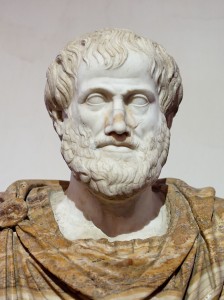
The history of what is considered logical, rational, real has changed drastically throughout history. It will continue to change as we change. Or, to put this into very contemporary vernacular, we talk about “realz” versus “feelz” as though they were completely separate entities, as though they were not, as Barad says, “always already entangled.”
Does Tracer’s pose matter? Do butt-centric poses ever matter? Do tight pants, and heaving bosoms, or small bosoms, or whether or not a female character must be saved by a male character? There’s no one answer, no objective measure. There are only personal reactions, and the results of us crashing into one another, creating entanglements that produce society, industry, perception, world. We present our own worlds as facts because it is so hard to see outside experience and perception; we present logic and reason without much considering how logic and reason is built in relation to those worlds. How it is all knotted together in such a way that it can never be untied. How we can never create the game that is perfect for everyone, because there are contradictory desires at play across audiences, needs, developers, and worlds, and how that’s okay, because we will work through it all the same.

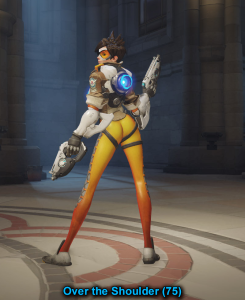

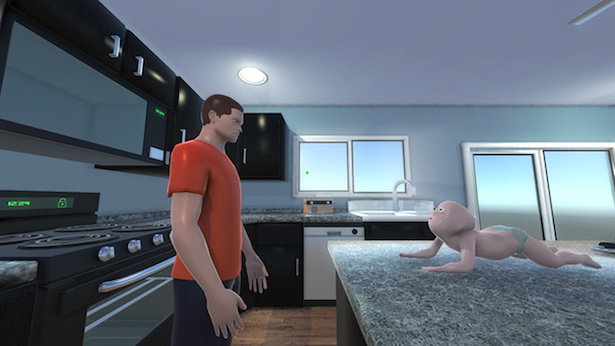
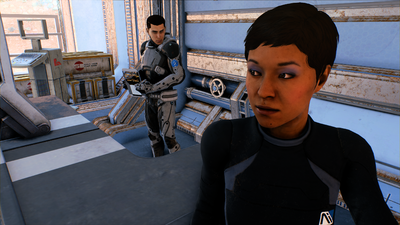
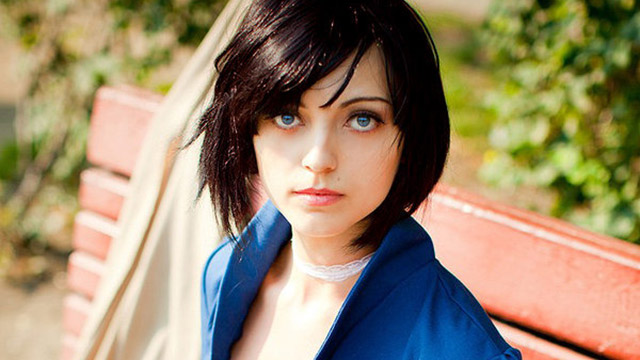
2 thoughts on “The Rational is Personal: Overwatch and Fan Debates”
This is the only post with the butts tag. For shame.
You’re right. That’s been remedied.